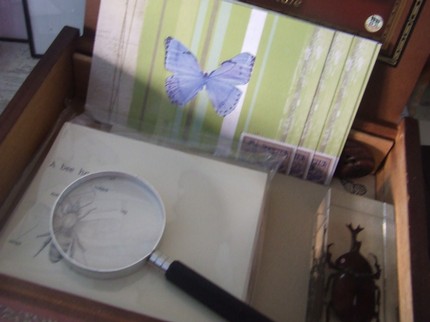Made in Chicago: Wickedpen
By Jess D'Amico in Miscellaneous on Dec 6, 2007 10:38PM
 Made in Chicago is back once again, to help you find socially-conscious and feel-good presents that will allow starving artists to buy dinner, or more yarn to knit their kid a scarf.
Made in Chicago is back once again, to help you find socially-conscious and feel-good presents that will allow starving artists to buy dinner, or more yarn to knit their kid a scarf.
Kristy Bowen, 33, is a poet and visual artist originally from Rockford. Bowen runs Dancing Girl Press, an online zine and publishing company committed to producing the work of female poets. She also sells delicious writerly and post-Victorian items from hand dyed slips to vintage liquor labels from her Wickedpen Etsy shop, Dulcet. We especially love, and lust after, this naturalist-esque writer's box, which we're sure would inspire us to think of more colorful summery days during the white winter.
We gave Kristy the Made in Chicago treatment, and she gave us her thoughts on writing and the art of craft:
Chicagoist: How do you make your art stand out from everything else on Etsy?
Kristy Bowen: There’s a lot of debate over whether one should, as a store, essentially “brand” themselves with a unique product or offer a variety of things for shoppers. I’ve always envisioned dulcet, which grew out of what was initially the dancing girl press storefront, as sort of a boutique where all sort of interesting things could be found. I’d call it one part Victorian naturalist and one part Marie Antoinette, with a little bit of the carnivalesque and 50’s secretary thrown in. As for dancing girl press titles, there’s only a handful of poetry related entities on etsy, so it’s not difficult to stand out at least when it comes to that category.
C: Where do you want to go with your art (where do you see yourself in
five years)?
KB: As a poet and artist, I’m interested in the tension between notions of “art” and “craft,” ie. how one looks at one or the other with certain preconceptions in mind. With the etsy shop, where I was initially selling poetry chapbooks from dancing girl press, paper goods, and visual art pieces, I’ve recently tried my hand at more crafty things, to have a bit more fun with the idea and conception of the shop. I’d guess in all my various arenas to continue making things, be they poems, or art pieces, or simply things meant to be pretty, and maybe blissfully at some point be able to do some combination of them for a living.
C: How did you first get into DIY?
KB: I was standing in front of the zine and chapbook racks at Quimby’s Bookstore about four years ago, which was where the idea to start a chapbook press was sparked and snowballed rather nicely from there. A printer, some cardstock, a bone folder, and a big old stapler and I had a book. Since then, we’ve increased our titles every year, bought a nice laser printer and a good paper trimmer. For the past four years pretty much I’ve been running the whole thing from my dining room, but just moved the whole operation into a studio space, where I plan to host readings, workshops, and events as well as use it as a central workspace.
C: What's your artistic process look like?
KB: It’s amazing how over the years my writing process as a poet has come more to resemble my process as an artist. I remember that I used to take a more focused, pragmatic approach to writing, to decide to write about x or y and just sit down and do it. Now collage in a written sense plays a much bigger role in my process. I find myself keeping a notebook as I go through the day, as I experience and read things, then sitting down and piecing things together. The effect is definitely more fragmented, but it’s also more interesting, since I never know what I’m going to end up with.
C: What's the Chicago DIY scene look like?
KB: At least in publishing, I see I lot of interesting things going on. Tiny presses emerging, both print and online literary journals cropping up, a lot of zinesters still putting out issues. It’s awesome.
C: Where do you see DIY culture going?
I think as people become more and more disillusioned with the way things are, be it obsolete publishing hierarchies & systems, rampant commercialism, media conglomerates, etc., DIY will thrive even more, and the appeal be even greater for both artists trying to get their work out and consumers who want to be a part of it.
C: Lastly, do you have any advice for other crafty people wanting to start selling their goods?
KB: Do what you love and hopefully you can engender that same sort of enthusiasm in potential customer.
Know somebody crafty/artsy-fartsy you think should be featured? Let us know: madeinchicago[at]chicagoist[dot]com